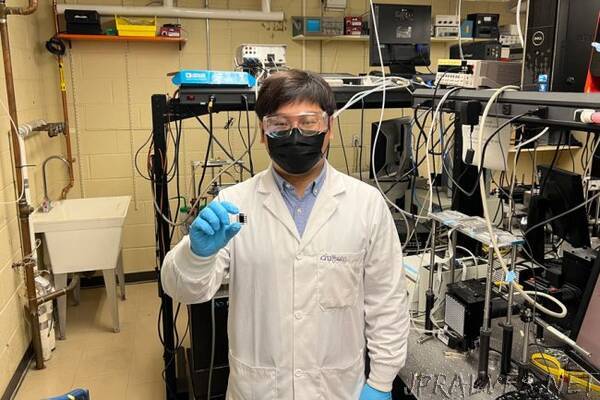
“An international team — including U of T Engineering researchers — has developed a new technique to enhance the durability of inverted perovskite solar cells.
The advancement is an important step toward commercialization of this emerging photovoltaic technology, which could significantly reduce the cost of solar energy.
“Perovskite solar cells have the potential to overcome the inherent efficiency limitations of silicon solar cells,” says U of T Engineering Professor Ted Sargent (ECE), who recently joined the Department of Chemistry and the Department of Electrical and Computer Engineering at Northwestern University.
“They are also amenable to manufacturing methods that have a much lower cost than those used for silicon. But one place where perovskites still lag silicon is in their long-term durability. In this study, we used a rational-design approach to address that in a new and unique way.”
Unlike traditional solar cells, which are made from wafers of extremely high-purity silicon, perovskite solar cells are built from nano-sized crystals. These perovskite crystals can be dispersed into a liquid and spin-coated onto a surface using low-cost, well-established techniques.
It is also possible to tune the wavelengths of light that get absorbed by the perovskites by adjusting the thickness and chemical composition of the crystal films. Perovskite layers tuned to different wavelengths can even be stacked on top of each other, or on top of traditional silicon cells, leading to ‘tandem’ cells that absorb more of the solar spectrum than today’s devices.
In recent years, Sargent and his collaborators have made several advances that improve the performance of perovskite solar cells. But whereas much of this previous work focused on enhancing efficiency, their latest work looks at the challenge of durability.
“One key point of vulnerability in these types of solar cells is the interface between the perovskite layer and the adjacent layers, which we call carrier transport layers,” says Chongwen Li, a postdoctoral fellow who recently moved to U of T Engineering from the University of Toledo. Li is one of three co-lead authors in a new paper outlining the research, published in Science.
“These adjacent layers extract the electrons or holes that will flow through the circuit. If the chemical bonding between these layers and perovskite layer gets damaged by light or heat, electrons or holes can’t get into the circuit — this lowers the overall efficiency of the cell.”
To address this issue, the international team — including researchers from the University of Toledo, the University of Washington, and Northwestern University, as well as U of T — went back to first principles. They used computer simulations based on density functional theory (DFT) to predict what kind of molecules would be best at creating a bridge between the perovskite layer and the charge transport layers.
“Previous research has shown that molecules known as Lewis bases are good for creating strong bonding between these layers,” says Bin Chen, another postdoctoral researcher in Sargent’s lab, now a research assistant professor at Northwestern University and a co-author on the paper.
“This is because one end of the molecule bonds to the lead atoms in the perovskite layer, and the other bonds to the nickel in the carrier transport layers. What our simulations predicted was that Lewis bases which contained the element phosphorus would have the best effect.”
In the lab, the team tried out various formulations of phosphorus-containing molecules. Their experiments showed the best performance with a material known as 1,3 bis(diphenylphosphino)propane, or DPPP.
The team built inverted perovskite solar cells that contained DPPP, as well as some without. They subjected both types to tests that simulated the kind of conditions solar cells would experience in the field, illuminating them with light at a similar intensity to the sun. They also tried exposing them to high temperatures, both in the light and in the dark.
“With DPPP, under ambient conditions — that is, no additional heating — the overall power conversion efficiency of the cell stayed high for approximately 3,500 hours,” says Li.
“The perovskite solar cells that have been previously published in the literature tend to see a significant drop in their efficiency after 1,500 to 2,000 hours, so this is a big improvement.”
Li says the team has applied for a patent for the DPPP technique, and has already received interest from commercial solar cell manufacturers.
“I think what we’ve done is to show a new path forward: that DFT simulations and rational design can point the way toward promising solutions,” he says.
“But there may be even better molecules out there. Ultimately, we want to get to a place where perovskite solar cells can compete commercially with silicon, which is the state-of-the-art photovoltaic technology of today. This is an important step in that direction, but there is still further to go.””
